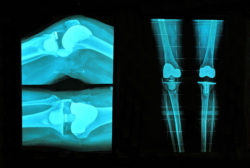Top Class Actions’s website and social media posts use affiliate links. If you make a purchase using such links, we may receive a commission, but it will not result in any additional charges to you. Please review our Affiliate Link Disclosure for more information.

During knee replacement surgery, the natural joint is replaced with an implant to mimic movement. Damaged bone is typically removed to make way for the implant, which is secured with screws and bone cement. Bone cement is not always used to attach an implant, but it is a common strategy.
There are three widely used types of bone cement used in total knee replacements: low viscosity bone cement, medium viscosity bone cement, and high viscosity bone cement. High viscosity bone cement may be preferred by surgeons because it taxes less time to mix and sets more quickly. However, it may result in knee replacement cement failure according to recent claims by researchers that the products fail to adhere to bone.
Knee replacement cement failure may cause a variety of side effects including aseptic loosening. Aseptic loosening typically occurs where an implant attaches to the tibia and involves the loosening of the implant without any accompanying infection. The side effect can occur due to fragmenting of the bone cement or because the bond between the bone and the cement is broken.
In 2016, a report was published by the National Center for Biotechnology Information (BNBI) investigating 13 cases of aseptic tibial loosening. The researchers in the report linked the tibial loosening of implants due to the usage of high viscosity bone cement. Implants which were attached using low or medium viscosity bone cements reportedly did not result in the debonding that was seen with high viscosity bone cement.
If implant loosening occurs, patients may have to undergo revision surgery. During revision surgery, a surgeon removes the previous implant and replaces it with a new implant. If bone and tissue have been damaged by knee replacement cement failure, the surgery may be longer and the surgeon may need to graft new bone to support the new implant.
According to the American Academy of Orthopedic Surgeons (AAOS), a variety of risks are associated with revision surgery including: poor wound healing; reduced range of motion or stiffness in the knee; infection in the wound or the new prosthesis; bleeding; blood clots; bone fracture during surgery, damage to nerves or blood vessels; pulmonary embolism—a blood clot in the lungs; and medical problems such as heart attack, lung complications, or stroke. Even after the surgery, it may take a long time for the body to recover from the intense surgery.
Multiple lawsuits have been filed regarding knee replacement cement failure. One knee replacement cement failure lawsuit was filed in June 2018 against a Johnson & Johnson subsidiary, alleging that the SmartSet HV Bone Cement’s defective nature caused implant failure only a year after initial knee replacement surgery.
Numerous high-viscosity bone cements are under investigation by attorneys, including: Cobalt HV Bone Cement (Biomet/DJO Surgical); DePuy CMW 1 Bone Cement (NOT CMW 2 or CMW 3); Simplex HV Bone Cement (Stryker/Howmedica); and SmartSet HV Bone Cement (DePuy).
If you or a loved one underwent revision knee replacement surgery or your doctor is recommending revision surgery three years or less after the initial implant and a bone cement was used, you may qualify to file a knee replacement revision surgery lawsuit. See if you qualify by filling out the free form on this page.
ATTORNEY ADVERTISING
Top Class Actions is a Proud Member of the American Bar Association
LEGAL INFORMATION IS NOT LEGAL ADVICE
Top Class Actions Legal Statement
©2008 – 2024 Top Class Actions® LLC
Various Trademarks held by their respective owners
This website is not intended for viewing or usage by European Union citizens.
Get Help – It’s Free
Join a Free Knee Replacement Cement Failure Lawsuit Investigation
If you qualify, an attorney will contact you to discuss the details of your potential case at no charge to you.
PLEASE NOTE: If you want to participate in this investigation, it is imperative that you reply to the law firm if they call or email you. Failing to do so may result in you not getting signed up as a client or getting you dropped as a client.
Oops! We could not locate your form.












